

Concentration, Manipulation and Margin Calls. Over the past 25 years the financial markets of the world have become highly concentrated in the intermediation of a handful of firms, and regulation has been harmonised in the interests of these few firms.

As Adam Smith - that great proponent of free markets - cogently observed: “People of the same trade seldom meet together, even for merriment and diversion, but the conversation ends in a conspiracy against the public, or in some contrivance to raise prices.” Sadly, these few global firms have been for some time in "a conspiracy against the public", and have subverted the organs of public governance and the infrastructure of the financial markets to their purposes.
Is property going social? I’ve got a feeling something interesting is happening to the way real estate operates online in the UK.

Anecdotal evidence is emerging that social networks like Facebook and less conventional startups are perhaps starting to find the chink in the armour of the traditional property listing market here. In particular, Facebook Marketplace is starting to be used by niche poperty agencies like Pimlico Flats, more successfully than the usual online suspects like Craigslist and Gumtree. Debunking free marketarianism. By Linda Bealecrossposted with Ataxingmatter Richard Abrams: debunking free marketarianism I’ve often written here about the problems of the naive, black-or-white view of economics that has been fostered by the Chicago School and Milton Friedman acolytes who talk of “free markets” as though markets exist in vaccum tubes unaffected by the social, cultural and legal context around them.
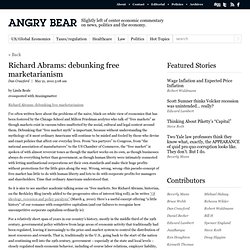
End Of The Free Market. When you write a book called The End of the Free Market, you can be pretty sure what the first question is going to be: "Do you really believe we're seeing the end of the free market?

Really? " Yes, I do. But there are two important caveats. Not everywhere and (hopefully!) Not forever. The world economy: The odd decouple. Second Law of Thermodynamics May Explain Economic Evolution. (PhysOrg.com) -- Terms such as the "invisible hand," laissez-faire policy, and free-market principles suggest that economic growth and decline in capitalist societies seem to be somehow self-regulated.

Seven States of Energy Debt. Out here on Cottage Grove it matters.
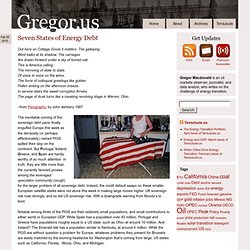
The galloping Wind balks at its shadow. The carriages Are drawn forward under a sky of fumed oak. This is America calling: The mirroring of state to state, Of voice to voice on the wires, The force of colloquial greetings like golden Pollen sinking on the afternoon breeze. In service stairs the sweet corruption thrives; The page of dusk turns like a creaking revolving stage in Warren, Ohio. –from Pyrography, by John Ashbery 1987. Payback Time - Wave of Debt Payments Facing U.S. Government - Series. Twenty-Five Years to Work Off the Debt Overhang? T.
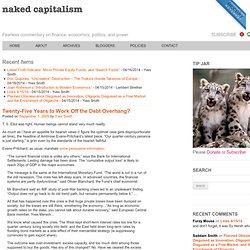
S. Eliot was right. Markets without Capitalism as part of P2P economics (2): Kevin Carson’s transition proposals. This is a follow up on yesterday’s post, arguing that the idea and practice of markets, should be divorced from their present embeddedness in an unsustainable infinite growth system such as capitalism.
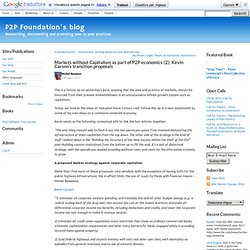
Today, we look at the ideas of mutualist Kevin Carson. I will follow this up in a next installment by some of my own ideas on a commons-centered economy. Kevin sends us the following contextual info to link the two articles together: “The only thing I would add, to flesh it out: the two pieces you quote from involved dismantling the infrastructure of state capitalism from the top down. Portfolio Theory. Place of heteregeneous and egalitarian markets in a hybrid and plurarist P2P Polity. It is important to understand that while the P2P approach is opposed to the infinite growth mechanism that is capitalism, and to its exclusion of the majority of the people of the ownership of their means of production, it is in no way against markets as such.
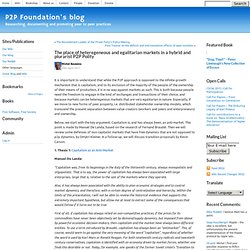
This is both because people need the freedom to engage in the kind of exchanges and transactions of their choice, and because markets can be heteregenous markets that are very egalitarian in nature. Especially, if we move to new forms of peer property, i.e. distributed stakeholder ownership models, which transcend the present separation between value creators (workers and peers and enterpreneurs) and ownership. Below, we start with the key argument.
Capitalism is, and has always been, an anti-market. This point is made by Manuel De Landa, based on the research of Fernand Braudel. 1. Manuel De Landa: Product Variety, Consumer Preferences, and Web Technology: Can the Web of Data Reduce Price Competition and Increase Customer Satisfaction? Taking Distribution Seriously by Robert C. Hockett.
Tom Ferguson: The Invisible Hand Is Waving Goodbye. Replacing Cap and Trade and Carbon Taxation with Cap and Reward systems. Cap and Trade and Carbon Taxation won’t work, because there is an immediate cost but no immediate benefit.
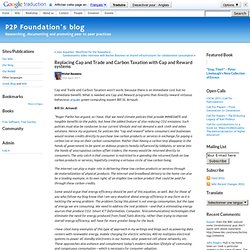
What is needed are Cap and Reward programs that directly reward virtuous behaviour, argues green computing expert Bill St. Arnaud. Bill St. Arnaud: “Roger Pielke has argued, as I have, that we need climate policies that provide IMMEDIATE and tangible benefits to the public, but have the added feature of also reducing CO2 emissions. The Internet can play a major role in delivering these low carbon products or services through de-materialization of physical products. Some would argue that energy efficiency should be part of this equation, as well. I have cited many examples of this type of approach in my writings and blogs such as powering data centers with renewable energy, mobile charging for electric vehicles, 400 Hz multiplex electrical systems to power all standby electronics in our homes, solar powered cell phone networks, etc.
Competing with free: anime site treats piracy as a market failure. When lawyer Evan Stone worked as an in-house counsel for anime distributor FUNimation, the company tried all sorts of techniques to stop piracy. It sent takedown notices and DMCA complaints to anyone who would listen, like ISPs (which sometimes took action) and torrent sites (which rarely did). It hired outside firms to flood torrent sites with bogus files. It put more than 90 series online for free streaming.
Stone finally came to believe that suing file-sharers was the only approach left. "I didn't know what other options we had," he told me earlier this year. But making money in anime isn't hopeless; it turns out that anime lovers will pay for content even in an age of widely available free versions. Pirates can't compete with this kind of availability, since even the most dedicated fansub groups need time to do their own translations.
The Structure of the Economy May Change Faster Than We Can Learn About It. Culture, Contradiction and Marketing Pragmatism. In Search of..... - TV.com www.tv.com/shows/in-search-of Narrarated by Leonard Nimoy, In search of was a 30 minute syndicated show that covered a wide range of paranormal topics. It pioneered a lot of the methodology that ... Search Engine - Download.com. Entrepreneurs, Economics, & Education. In a recent post about Indian entrepreneurs [Entrepreneurs in India], I focused on a number of entrepreneurial enterprises that are receiving international attention. Almost daily, Indian entrepreneurs continue to draw attention. An article in The Economist declares that "the rich world’s bloated health-care systems can learn from India’s entrepreneurs" ["Lessons from a frugal innovator," 18 April 2009 print issue].
The article begins in the operating room of an Indian hospital where a patient lies wide awake and chatting while his doctors open his chest and operate on his heart. The State of the Art of Complementary Currencies and its Open Source Software in 2010. The State of the Art of Complementary Currencies and its Open Source Software in 2010 Michel Bauwens 9th April 2011 “The International Journal of Community Currency Research (IJCCR) has produced a special edition which details some of the recent developments in the field of complementary currencies. It contains fifteen short papers which encompass discussions of the wider field, geographic reviews and reports on new forms of currency innovation.
Market design helps people attain goals effectively. Michael Giberson Harvard economic systems designer Al Roth is profiled in the Boston Globe: Academically speaking, Roth is a pioneer of so-called market design: finding situations where a market is failing — often, a place that most people wouldn’t even recognize as a market — and making it work better. Roth has influenced a cadre of young, energetic market designers, many of whom have taken up prominent positions at top universities. Inspired by Roth’s work, these rising economists are also setting their sights on real-world problems.
Some are looking at dating websites; others are interested in how universities could do better at scheduling their students’ classes. Ben Edelman - Home. Biography - Peter A. Coles. Al Roth's game theory, experimental economics, and market design page. Updated 9/8/12 Check out my Market Design Blog Comments welcome at al_roth"at"harvard.edu Update: 1/30/13. I am slowly getting a new webpage at Stanford: For a little while its links will still point back here, but eventually it will be self contained. I'll do new updates there, so please point your browsers to my new page.
(It's been a while since I updated this page, but I've kept updating my Market Design Blog (and the most exciting posts are probably this one on my students on the job market this year, and those tagged Nobel). Update: 9/8/12. My Harvard mailing addresses, phone numbers, and other contact info are here. The Matchmaker. One day in 1995, Alvin Roth picked up the phone to discover that someone had finally called his bluff. The New American Normal - NYT.